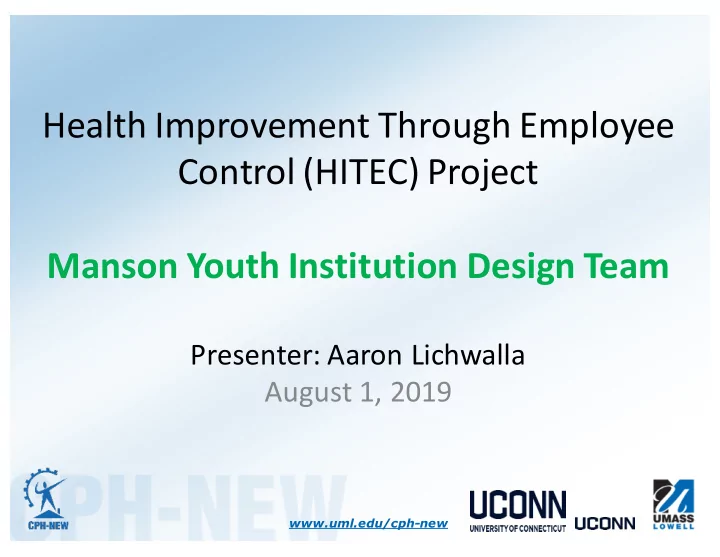

Health ¡Improvement ¡Through ¡Employee ¡ Control ¡(HITEC) ¡Project Manson ¡Youth ¡Institution ¡Design ¡Team Presenter: ¡Aaron ¡Lichwalla August ¡1, ¡2019 www.uml.edu/cph-new
Implementation of Design Team Identify Facility Recruit members for the Design Team Coordinate logistics: day, time, meeting area Training on IDEAS process www.uml.edu/cph-new
Manson ¡Youth ¡Institution ¡Design ¡Team Meeting ¡Location Maloney Center ¡for ¡Training ¡and ¡Staff ¡Development Design ¡Team Focus Identify ¡and ¡Mitigate ¡Work ¡Stress ¡Factors ¡ Structures ¡ The ¡ Design ¡Team ¡ consists ¡of ¡9 ¡NP-‑4 ¡Correctional ¡ staff ¡ members ¡who ¡participate ¡in ¡2 ¡hour ¡meetings twice ¡a ¡month, ¡ co-‑facilitated ¡by ¡two ¡of ¡their ¡members ¡and ¡advised ¡ by ¡UConn ¡ Staff. ¡ The ¡ Facility Steering ¡Committee ¡ consists ¡of ¡supervisors ¡ (Wardens, ¡ Deputy Wardens ¡and ¡Captains), ¡Union Representatives ¡ and ¡the ¡DT ¡Facilitators. ¡ Consultation ¡ with ¡ Video ¡Conference with ¡Clinical ¡Psychologist ¡Dr. ¡Monnica ¡ Williams ¡(April ¡18 th 2018) Clinical Expert Timeline Orientation: ¡ Dec ¡21, ¡2017 IDEAS ¡Training: ¡ Jan ¡19, ¡2018 First ¡Design ¡Team ¡meeting: ¡ Jan ¡24, ¡2018 Presentation ¡ to ¡Facility ¡Steering ¡Committee: ¡ Nov ¡19, ¡2018
Intervention, ¡Design, ¡and ¡Analysis ¡Scorecard: ¡ a ¡participatory ¡intervention ¡planning ¡method Designing interventions with IDEAS is an iterative process Step 1 Understanding the problem Step 2 Creating full set of possible solutions Steps 3,4 Analyzing costs, benefits, barriers Formulate alternatives Step 5 Rating, selecting best option www.uml.edu/cph-new
Step 1: Fishbone Diagram: Identify Health & Safety Problem/Issue and Contributing Factors Lack of Space for Inefficient Decompression/ report writing report writing Feasible location Lack of computers to submit reports Proximity to post Essential equipment/ Lack of space amenities with resources Square footage/ space Identify Work Stress Factors that impact staff Lack of policy Lack of time for incident documentation Lack of decompression space Post incident decompression time www.uml.edu/cph-new
IDEAS Steps 2-4 Step 2: Create a major health and safety objective: Mitigate Work Stress / Post-Incident Stress Exposure Develop solutions and specific activities Step 3: Identify criteria for selection and evaluation of activities Step 4: Evaluate the solution and activities (Step 2) with the selection criteria (Step 3) www.uml.edu/cph-new
Step 5A: Package and Rate Interventions Intervention Package 1. Create a space for decompression: Build or lease a new structure in a central location that includes: – Computers with secure internet and printers – Feasible location closer to post and response location – Bathroom and Kitchenette – Space for table/chairs and couch – Efficient and relaxing set up with nice decorations – TV to be connected to outside world 2. Improve post incident decompression and recovery time – Strategies/tools for post incident stress – Training and education about incidents – Create policy to address decompression time 3. Create an efficient area for report writing – Training for supervisors and staff for report writing – Policy to relieve officers for report writing www.uml.edu/cph-new
IDEAS Steps 5B-7 Step 5B: Facility Steering Committee rates the proposed interventions Step 6: Design Team works with Steering Committee to Implement the interventions (ongoing) Step 7: Develop and Evaluation Plan (ongoing) www.uml.edu/cph-new
Challenges and Successes Challenges Changes in Design Team and Facility Steering Committee membership • Recruitment and retraining of new members Change focus half way through because of incidents Successes Agency and Facility buy in Facility Mental Health Wellness Fair Development and implementation of a pre- intervention survey (N=166 of 283 staff members) www.uml.edu/cph-new
Design Team Survey Results Which of the following resources could benefit report writing at your facility? 100 90 80 70 % ¡ Response 60 50 Yes 40 30 No 20 10 0 Training Designated ¡ Relief ¡coverage List ¡of ¡specific ¡ Spell ¡check location ¡close ¡ phrases ¡posted to ¡post www.uml.edu/cph-new
Expectations for a Decompression Area Design Team Survey Results Decompression Time following Critical Incidents 90 100 80 90 80 70 70 60 60 50 % ¡ Response % ¡Response 50 40 Yes Yes 40 30 30 No 20 No 20 10 10 0 0 Staff ¡ Inmate ¡ Code ¡ Assault Suicide ¡ Blue or ¡ Homicide www.uml.edu/cph-new
Design Team Survey “There is no designated area to write the report…couple of places that have become common, but these don’t always have a computer or other resources to write them.” “More often than not, inmates seem to take precedence over staff…” “…the phone rings constantly after a code… you’re not completely thorough with your incident report because of the pressure to finish” www.uml.edu/cph-new
Design Team Survey “We have to just continue on as if nothing transpired, strange human reaction to ignore.” “…codes are called and/or cleared school continues and we at times have to work in an area contaminated after use of chemical agent” “…still movement within the facility which allows for more codes and stressors of having to respond in the right state of mind.” www.uml.edu/cph-new
Contacts & Acknowledgements University of Massachusetts Lowell University of Connecticut Sandy Sun, Center Administrator UConn Health, Farmington, CT Email: Sandy_Sun@uml.edu UConn Storrs, Mansfield, CT Tel: 978-934-3268 University of Connecticut CPH-NEW general email: CPH-NEW website: cphnew@uml.edu http://h.uconn.edu/cph-new Contact: Matt Brennan , Project CPH-NEW main website: Manager www.uml.edu/cph-new Email: brennan@uchc.edu Tel: 860-679-2110 Healthy Workplace Participatory Program Website: www.uml.edu/cphnewtoolkit The Center for the Promotion of Health in the New England Workplace is supported by Grant Number 1 U19 OH008857 from the U.S. National Institute for Occupational Safety and Health. This content is solely the responsibility of the authors and does not necessarily represent the official views of NIOSH. www.uml.edu/cph-new
Recommend
More recommend